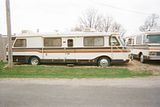Go to...  | Start A New Topic  | Search  | Notify  | Tools  | Reply To This Topic  |  |
This is interesting reading. It is a mixture of 25% water, diesel fuel and a emulsifier. This could be come our future fuel. Just do a search for hydro diesel. '92 Barth Breakaway - 30' 5.9 Cummins (6B) 300+ HP 2000 Allison Front entrance | |||
|
I recall hot rodders, way back when, told me that they would somehow spray water into their fuel mixture. Water being noncompressionable (sic) it's presence in the cylinder would increase the compression ratio. I guess it put quite a strain machinery. #1 29' 1977parted out and still alive in Barths all over the USA | ||||
|
 |
see: https://en.wikipedia.org/wiki/Emulsified_fuel https://www.powerboatandrib.com/tag/hydro-diesel/ https://www.youtube.com/watch?v=Q0d3E-R3SvU >>>> http://oxy-hydro.com/ https://pocharitechnologies.co...cle-hydrogen-engine/ https://pocharitechnologies.co...n-engine-technology/ _________________________ The 82 MCC {by Barth} is not an rv-- it is a Motor Coach!! | |||
|
Official Barth Junkie |
The addition of water to the combustion mixture will lower peak combustion temperatures. Early high performance engine designers quickly learned the advantages of high compression ratios. The downside was the need for high octane gasoline to prevent detonation. Eventually the use of high compression, super and turbocharging, put the engines on the hairy edge of detonation much of the time. It was discovered that introducing some water into the combustion chamber would reduce detonation. Water has a very high heat of vaporization. The liquid water introduced into the combustion chamber vaporized quickly, absorbing heat in the process. This cooled the mixture. Also the presence of the water gas (steam) helped control the flame front spread throughout the chamber. By suppressing detonation, the water injection allowed maximum output without detonation. It was widely used in supercharged aircraft engines in WWII. (They also used 130 octane avgas!) To be clear, water is not a fuel. The power increase was due to better control of the existing combustion process. This was only significant at maximum boost since detonation usually does not occur at light loads. More recently it was discovered that lower peak combustion temperatures produced lower NOx pollutants. Again, a plus on the emission side, but considering that all internal combution engines produce power by heating/expanding the gases produced during combustion, anything that lowers the heat in the chamber (in the absence of detonation) must lower power output. Even more recently, the giant diesel engines used in ships, etc burn a very crude diesel fuel known as Bunker C (crude). The stuff is like tar. Using some water in that stuff makes it easier to pump through pipes, etc. For small modern high pressure injected diesels, I see little future in the use of water emulsion fuels. No improvement in heat content/mileage, cold starting, or lubricity of the fuel would be expected. Further, any separation of the fuel/water emulsion would wreak havoc with the fuel filters and injectors. 9708-M0037-37MM-01 "98" Monarch 37 Spartan MM, 6 spd Allison Cummins 8.3 325+ hp | |||
|
| Powered by Social Strata |
| Please Wait. Your request is being processed... |
|
This website is dedicated to the Barth Custom Coach, their owners and those who admire this American made, quality crafted, motor coach.
We are committed to the history, preservation and restoration of the Barth Custom Coach.
We are committed to the history, preservation and restoration of the Barth Custom Coach.